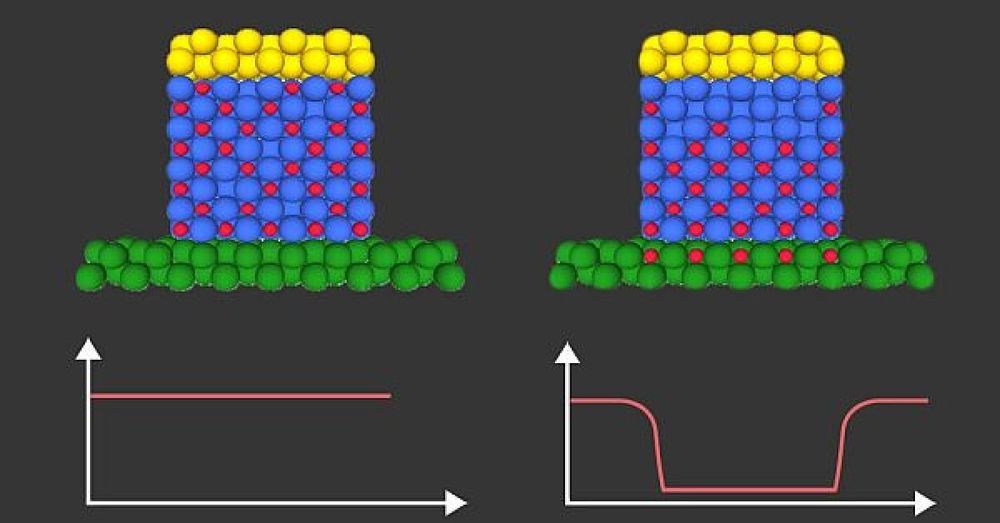Innovative nanosheets made from equal parts of hydrogen and boron have a greater capacity to store and release hydrogen compared with conventional metal-based materials.



Join our global movement to extend the human healthspan by accelerating research, innovation, and entrepreneurism in healthy longevity.
face_with_colon_three
There’s no telling what you can do when you put your mind to it. Take Richard Hull, he built a small-scale fusion reactor—in a shed, in his backyard. A retired electronics engineer, Hull took a special interest in nuclear fusion. He lives in Lakeside, Virginia, with his cats and likes to pass on his knowledge and collaborate with others on projects. So he invites amateur scientists from all over the United States to meet at his home once a year to check out his reactor and share their inventions.
SUBSCRIBE: https://goo.gl/vR6Acb
#FusionReactor #NuclearFusion #amateur
This story is a part of our Frontiers series, where we bring you front and center to the dreamers, pioneers, and innovators leading society at the cutting edge. Let us take you along for a trip to the oft-imagined but rarely accomplished.

While many futures are generalists, there is a need for foresight professionals centered on specific fields, as well. Perhaps no area is more in need of innovative outlooks for the future than healthcare. With rising costs, aging populations and personnel shortages, the challenges are many. But so are the opportunities to employ emerging technologies. In the first part of a two part series, host Mark Sackler discusses these challenge with two nursing Ph.D.’s, Oriana Beaudet and Dan Pesut. Part One addresses the need for foresight both in nursing specifically and healthcare in general, as well as the global challenges of an aging population. Part two will drill down to individual ssues, including automation, robotics and artificial intelligence as caregiving tools for the future.

The televised gala, broadcast on the National Geographic Channel as well as YouTube and China’s Tencent, whose founder Ma Huateng is also a sponsor, played heavily on a theme that’s become somewhat tarnished in Silicon Valley in recent years—that scientific and technological progress will solve humanity’s biggest problems. For the past two years, Facebook and Google have both been battered by lawmakers and the public for how they’ve failed to eliminate the spread of fake news, conspiracy theories (sometimes about science) and content that connects violent extremists. Both Zuckerberg and Pichai have also countered rising complaints from the tech giants’ workforces.
Some of the top scientists who accepted Breakthrough Prize awards used the nationally broadcast ceremony to decry the spread of misinformation, problems that continue to dog the tech giants whose leaders, including Facebook CEO Mark Zuckerberg and Google CEO Sundar Pichai, celebrated at the glitzy Silicon Valley gala Sunday evening.
“Science is a rock of truth in a sea of fake news,” said physicist Peter van Nieuwenhuizen, who with collaborators Sergio Ferrara and Daniel Freedman accepted an award Sunday evening for their work around the theory of supergravity.
David Julius, a University of California at San Francisco physiology professor who won a $3 million award for research into the capsaicin found in chili peppers and pain relief, noted “we live in a time when technology and so many other resources make so much possible. ”

Holon-based cancer immunotherapy company Compugen disclosed encouraging preliminary results on Tuesday from its Phase 1 clinical trial for an antibody acting against a novel cancer drug target (PVRIG) in patients with advanced solid tumors.
The Nasdaq and Tel Aviv-listed company, a pioneer in predictive drug target discovery, has developed innovative computational discovery platforms to identify new drug targets and subsequently produce first-in-class therapeutics. The clinical trial of the anti-PVRIG antibody, called COM701, aimed to assess the safety of escalating doses of the therapy in patients with advanced solid tumors, but also demonstrated initial signals of anti-tumor activity in the heavily pre-treated patient population enrolled in the study.
“We are encouraged by the emerging safety profile and initial signals of anti-tumor activity of COM701,” said Compugen president and CEO Dr. Anat Cohen-Dayan.
Liz Parish, CEO of BioViva and Bill Faloon, Co-Founder of Life Extension talk about new breakthroughs in age reversal.
This interview was conducted, by Richard Peritz during RAADfest 2019, to be included in a broadcast on ABC TV-25 in Palm Beach Florida, and other networks nationwide.

Very interesting.
Numerous vaccines, from flu shots to those those that help thwart chickenpox and measles, are widely used to guard against contagion, but researchers in France are proposing a breakthrough role for rotavirus vaccines: deploying them in cancer treatment.
Scientists from throughout France—Paris, Lyon, Villejuif and beyond—are part of a large research team that has asked a tantalizing question: Can rotavirus vaccines be repurposed to overcome resistance in cancer immunotherapy? The team is focusing on resistance that emerges to the form of cancer treatment known as checkpoint blockade immunotherapy.
So far, their investigation suggests the question about repurposing can be answered with a resounding “yes.”

This is yet another glaring example of the innovative spirit of Silicon Valley. The startup has been successfully testing the novel idea on its El Camino Real spacecraft — launched on a Russian Soyuz rocket in July 2019. Momentus will continue to perform simulations on its spacecraft for the next few months to gather enough data to compare it with the results of the ground tests to validate the proper functioning of the new system.
It’s spacecraft, El Camino Real, is a 16-unit CubeSat integrated by Astro Digital — a spacecraft manufacturer and geospatial data analysis company based out of California as well. Momentus has already secured funding of $34 million funding to develop two shuttles, Vigoride and Vigoride Extended, which will maneuver satellites between orbits.
The most prominent application for this is when new satellites are deployed in orbits via rockets. When the former is dropped off in orbits, they can be moved to optimal positions using this technology in a cheap & efficient manner. Momentus originally started off in 2018 as a transportation service for small satellites seeking rides to medium Earth, geostationary or low lunar orbit.